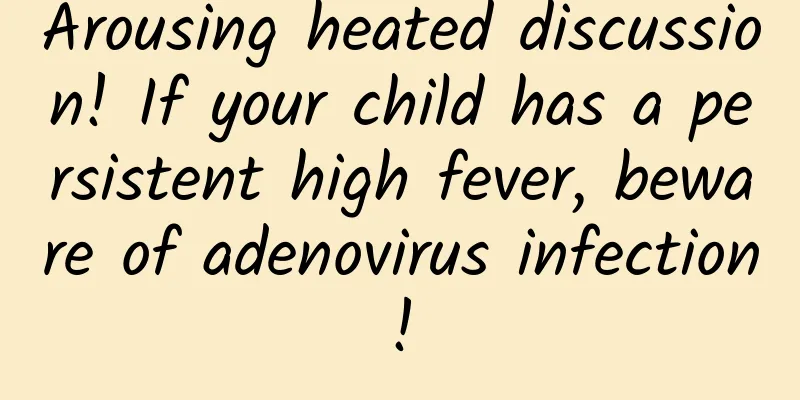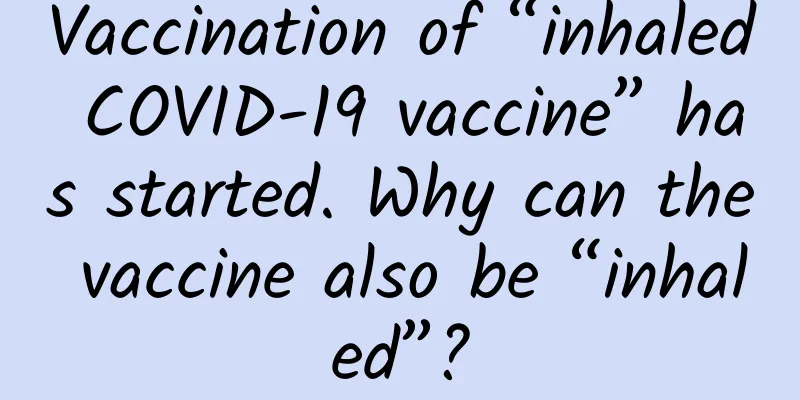Arousing heated discussion! If your child has a persistent high fever, beware of adenovirus infection!

|
Recently, the topic of "children's repeated high fever may be adenovirus infection" has caused heated discussion! Many parents have reported this situation. "My child had a fever for 5 days. In the first 3 days, the fever reached 39 degrees Celsius repeatedly, and the tonsils were severely swollen. The doctor said that the child was infected with adenovirus. It was heartbreaking to have to let the child slowly get through it on his own." "Today is the fourth day of adenovirus fever. We are waiting for him to get better from day to night and from night to day." "My daughter was also infected with adenovirus. It was the same. They said there was no specific medicine and that she would be fine once the course of the disease was over. Then they prescribed some saline solution for her to drink. They were afraid of dehydration. She had a fever for 7 days before she recovered." "My son has adenovirus and has a high fever of nearly 40 degrees Celsius! The doctor said there is no medicine to cure him and he can only rely on himself to recover. I don't know how many days the fever will last..." Adenovirus - common, severe clinical manifestations, many extrapulmonary complications, can cause disability or death The National Health Commission and the State Administration of Traditional Chinese Medicine organized multidisciplinary experts to formulate the "Guidelines for the Diagnosis and Treatment of Adenovirus Pneumonia in Children" for adenovirus pneumonia, pointing out that human adenovirus pneumonia is one of the more serious types of community-acquired pneumonia in children, and it is more common in children aged 6 months to 5 years. Some children have severe clinical manifestations and many extrapulmonary complications. Severe cases are prone to chronic airway and lung diseases, which is currently one of the important causes of death and disability from pneumonia in infants and young children. Adenovirus infection can cause a variety of diseases, including pneumonia and bronchitis, cystitis, conjunctivitis, gastrointestinal diseases, and encephalitis. The pulmonary and systemic inflammatory response caused by adenovirus is more severe than that caused by other viruses and can develop into multiple organ failure. Adenovirus and inflammatory mediators can cause edema, congestion, necrosis and shedding of the bronchial and bronchiolar mucosa, with necrotic material blocking the lumen; at the same time, it causes increased mucus secretion, blocking the lumen. Inflammatory cells such as neutrophils and lymphocytes infiltrate around the bronchi and bronchioles, as well as in the walls, alveolar walls, alveolar septa and alveolar cavities. In severe cases, tracheal elastic fibers, cartilage and smooth muscles can be destroyed, causing the airway to lose its normal structure. Children infected with adenovirus may have a high fever for 5 to 7 days. Don't take antibiotics blindly. Zhao Huiru, deputy chief physician of the Department of Pediatrics at the Third Affiliated Hospital of Zhengzhou University, said that if there are cases of adenovirus infection in the local area, with high fever lasting more than three days, pale complexion, poor mental response, lung rales, increased heart rate, and accompanied by symptoms such as cough, sore throat, and pharyngeal congestion, one should be highly vigilant about the possibility of adenovirus infection. Many parents are very anxious when their children have a high fever, not to mention that they have a high fever for so many days. Some will rush to take their children to the hospital, and some will let their children take antibiotics. "Viral infection is different from bacterial infection. Antibiotics have no effect on viral infection. Therefore, if the child is infected with adenovirus, antibiotics will not work. If it is influenza A or influenza B, it will also be ineffective." Hua Chunzhen, chief physician and head of the Department of Infectious Diseases at Zhejiang University Children's Hospital, said that when a child has a fever, do not blindly let him take antibiotics. Children with mild symptoms are mostly self-limiting, and excessive treatment should be avoided, such as the use of broad-spectrum antibiotics, glucocorticoids, bronchoscopy, etc.; children with severe symptoms need to master the indications and timing of broad-spectrum antibiotics, glucocorticoids, bronchoscopy, mechanical ventilation, etc., and extracorporeal membrane oxygenation and blood purification treatments need to be strictly controlled. The key to the treatment of severe children is to maintain airway patency, appropriate oxygen therapy, inhibit excessive inflammatory response, protect organ function, and promptly treat hemophagocytic syndrome. The effectiveness of current antiviral drugs such as ribavirin, acyclovir, ganciclovir, and cidofovir against adenovirus is uncertain, so do not use them blindly. Which children are more likely to develop severe symptoms? How to determine whether a child will develop pneumonia? Children who are prone to severe illness: those with underlying diseases including chronic cardiopulmonary disease, post-transplant or immunosuppression, malnutrition, neurodevelopmental disorders and muscle diseases; premature infants and infants under 3 months old; children with high fever for more than 3 to 5 days, accompanied by mental depression, gray complexion, significantly enlarged liver or hypoxemia; persistent wheezing; dense moist rales and wheezing in both lungs. Experts remind that if the high fever lasts for more than 5 days, further examination is needed to prevent the condition from worsening and progressing to pneumonia. On the premise of clarifying the cause of the disease, if the child's body temperature is relatively high but there is a downward trend and the child is in good spirits, parents do not need to worry too much. Experts say that more indicators can be observed: for example, taking less antipyretic drugs, the interval between each fever peak is longer, and the fever peak value decreases, etc., are all signs that the child is getting better. At the same time, we should pay special attention to the child's cough. Generally, mild adenovirus infection in children mainly causes symptoms in the upper respiratory tract, but if the high fever persists, the adenovirus will invade downwards, causing the child to cough violently. At this time, we should go to the hospital for an X-ray examination in time. The imaging manifestations are: rapid progression of lung shadows, multifocal consolidation in both lungs; bronchiolitis in both lungs, with or without atelectasis; lobar atelectasis or emphysema. Experts recommend that children infected with adenovirus should drink plenty of water, get plenty of rest, take active care, and reduce fever. For most children with normal immune function, adenovirus infection is self-limiting, and mild cases can generally heal on their own. |
<<: Urgent reminder! Don’t wear these colors when going out
Recommend
Google will abandon RenderScript in Android 12 and switch to Vulkan
Google announced today that with the launch of An...
Practical Collection | "Luckin Coffee" New Retail Hot-selling Growth Methodology
Like the spring thunder that scares away hundreds...
Why do puppies and cats shake their bodies after being splashed with water? | Nature Trumpet
Welcome to the 69th issue of the Nature Trumpet c...
Is "Shake" the peacemaker between TV and the Internet?
The 2015 Lunar New Year was a little later than u...
A little-known virus spreads in South America: What is Oropouche fever?
Produced by: Science Popularization China Author:...
Beware of monkeypox!
On May 30, the "Customs Release" releas...
The entire process of product construction from 0 to 1
This article reviews the entire process of buildi...
There will be heavy to torrential rain in northern Hubei and other places. Which areas will be affected by the torrential rain?
There will be heavy to torrential rain in norther...
Infected and in quarantine? Keep this list of items to keep!
Although the new coronavirus is rampant, don’t pa...
How can the education industry do short video live streaming well?
According to iResearch Consulting statistics: In ...
Google to release Android M system at the end of the month
[[133575]] On May 7, Google (Weibo) will hold its...
Salted duck eggs will "ooze oil", where does this oil come from?
Salted duck eggs, as the name suggests, are a kin...
Toyota is using cow dung to build a power station because Tesla criticized hydrogen fuel cell vehicles for not being environmentally friendly
In addition to Tesla and other manufacturers who ...
Focusing the Mind: The Evolution of the Brain
The superior wisdom of the human brain has create...
The first AI agent to master the game world! Can it follow instructions and take tasks like humans?
Video games are an important testing ground for a...









